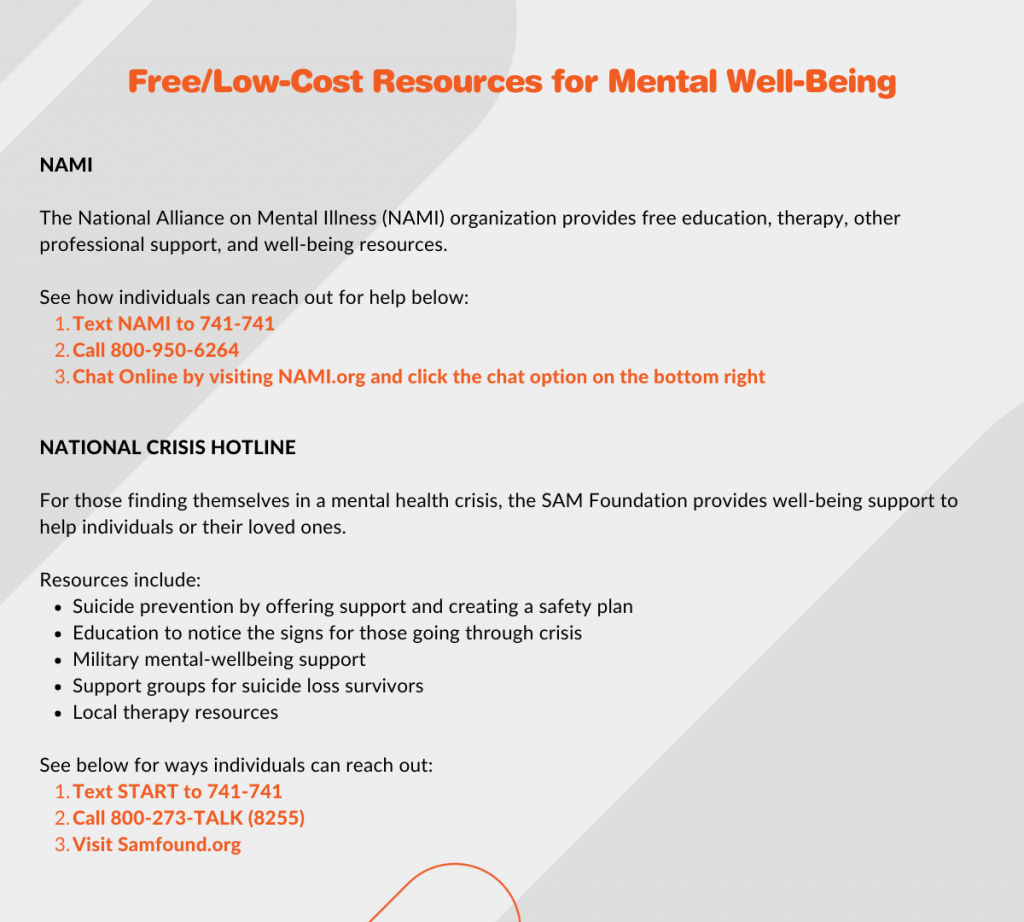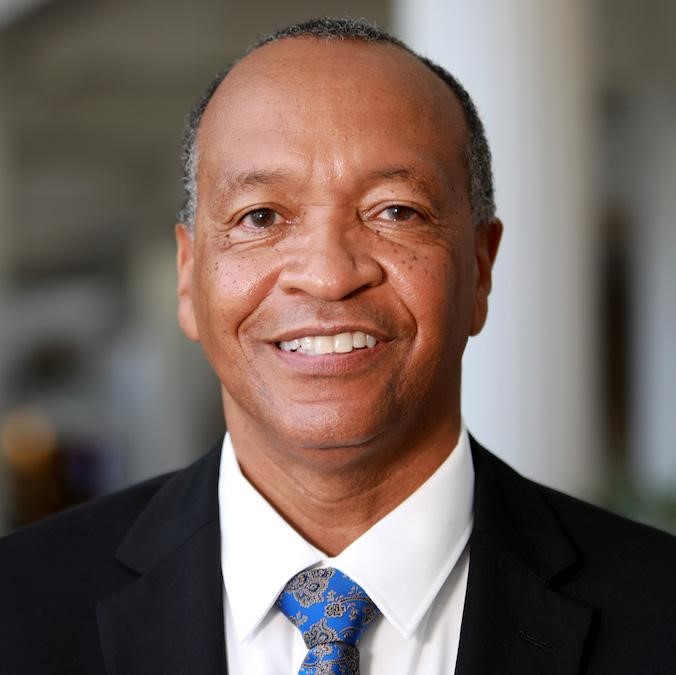
Minority Health and Why It’s Important to Prioritize Well-Being
There is a growing awareness around the unique challenges men, especially men of color, face regarding their mental health. However, toxic masculinity, various stigmas, and distrust of the healthcare system still run rampant, leaving many to suffer alone.
According to the Health and Human Services Office of Minority Health, Black adults in the U.S. are more likely than white adults to report persistent symptoms of emotional distress, such as sadness, hopelessness and feeling like everything is an effort. In addition, black adults living below the poverty line are more than twice as likely to report severe psychological distress than those with more financial security. Yet, despite the needs, only one in three Black adults who need mental health care receive it. Not getting the help you need for mental health can eventually lead to physical health complications.
That is why during Mental Health Awareness Month, Kelsey, Swoon’s YESability chairman, sat down with Dr. Charles Modlin and Stephen Elliott to discuss the importance of prioritizing well-being as a Black man in today’s society, the history behind why men tend to avoid seeking help, and various resources you can use to prioritize your physical and mental health.
About Our Panel:
Kelsey: “I am the chair of Swoon’s YESability committee, which is tasked with helping to eliminate the stigma of disabilities, both here at Swoon and across our network. A big portion of that has been with the mental health focus as we recognize that many individuals can relate to the mental health aspect.”
Dr. Charles Modlin: “I am a practicing urologist and have spent the last 28 years of my career at Cleveland Clinic. I not only practice urology, but one of my primary focuses as a clinical surgeon was in the area of kidney transplantation and access to organ donation. I also have a special affinity toward minority health, health equity, and the elimination of health disparities. I recently relocated over to The MetroHealth System, where I practice urology and am the first Medical Director of their Office of Equity, Inclusion, and Diversity. In that role, I am responsible for developing programs throughout the organization to address health equity. Throughout all the different clinical service lines, I also have a role in helping recruit a more diverse professional workforce. In addition, I have been heavily involved over the years in mentorship, community outreach, and community education.”
Stephen Elliott: “I have about 30 years in the biotech and pharmaceutical industry, with the last 15 years in rare diseases. As the Diversity, Equity, and Inclusion co-chair at ALN, I spent the previous year setting up a new employee resource network. A part of that is helping minority employees have access to our internal career advancement and looking at some ways to help them feel more included with our company and our industry. I also do a lot of outside work with organizations such as the Minority Men’s Health Fair, where 3,000 people came through, and it was amazing to be a part of that in multiple cities.”
Kelsey: Why do you feel that men tend to avoid seeking help when it comes to their mental health?

Dr. Modlin: There are various reasons, and first, I want to introduce you to the guy in the picture in the photograph sitting behind me. Often, people think that is a picture of myself, which it is not. It is a picture of my father, Charles Modlin Senior, who passed in 2010. He is the inspiration for why I do what I do. In the photo, he is wearing four gold medals he earned in the National Senior Games Association, Senior Olympics back in 2006. He won these gold medals for track and field events for men over 80, so I have big shoes to fill. I reference him because he is a source of not only my physical stamina but also my mental stamina. Concerning the question, why is it that many men, especially men of color, shun doctors? Why are they reluctant to go to the doctor’s office even for preventative health checks for their own good and benefit?
Well, there are many reasons for that. A lot of the reasoning, and we are not stereotyping or painting a broad picture for every single man or man of color, but many men of color feel a sense of distrust based on egregious actions that have occurred at the hands of medical professionals and medical researchers. The Tuskegee Syphilis Study is just one example. This study was conducted in Tuskegee, Alabama, from 1932 to 1972. The U.S. Public Health Service (USPHS) took about 800 Black men who they knew were infected with syphilis and denied them treatment because they wanted to study the natural consequences of untreated syphilis—keeping in mind that there was a treatment at the time, Penicillin. Many of these men suffered, and many died from secondary or tertiary syphilis and infected their partners. This study eventually leaked out to the community, which led to a lot of distrust in going or enrolling in clinical trials and going to the doctor’s office for health examinations. Many men feel like they will be disrespected or looked down on by their healthcare providers because they speak in medical terminology and do not explain what they are trying to convey to their patients. Not everyone has a medical nomenclature background, making it difficult for many patients to understand what has been said to them during an appointment. Fear, distrust, fear of being disrespected, looked down on, discriminated against, and judged are all reasons they might tend to avoid seeking help. Not to mention lack of health insurance and absence of the ability to pay for medical services. It is a complicated subject that all healthcare providers need to become aware of so we can understand how they are feeling, be empathetic, show that we are here to help them, and care about them.
Stephen: For about eight years of my career, I sold AIDS drugs early in the epidemic and was very involved in the community to the point where we could put an AIDS clinic in an inner-city Baptist church that the Cleveland Clinic sponsored. The purpose was to break down some of those barriers to gaining access to the healthcare system since we began to see more Black men become infected with HIV and AIDS. In the beginning, we were unsure about getting the message to them because of the distrust of going into the medical community for treatment. However, the drugs were advancing so rapidly that death rates in Ohio had fallen by 90% by the time I left that part of the industry. So, getting the message out there that becoming infected was no longer a death sentence was crucial. Unfortunately, we still have a long way to go because of the residual mistrust because there are still people out there who remember the Tuskegee Study. That mistrust keeps Black individuals, especially Black men, from going and interacting with the medical community. It also keeps them out of clinical trials that can help us develop better drugs for everyone.
Dr. Modlin: In the case of seeking mental health services, men in general, but especially men of color, have been taught that expressing you have stress, anxiety, depression, etc., is a sign of weakness. I am not saying that is how all men feel or what they were taught but historically speaking, that is how most men think. So, we have a lot to do to educate the younger generation, even the older generation, that this is not the case.
Kelsey: There is this stigma around men being weak when discussing mental health. How can we combat this to help educate men and people of color to manage their mental health? What resources can we provide to help eliminate that stigma?
Stephen: One of the big things that I will refer to is Dr. Modlin’s Men’s Health Fair. We helped break down many stigmas around mental health during the event. We also discussed how the attendees could access some of the available services. The other thing is to discuss it within your family to normalize it and let them know it is not a sign of weakness. It starts with men like Dr. Modlin and me, who are looked up to in the community, telling others that we go to therapy if we need to. The more it is talked about by leaders in the community, the more open others will be to getting help for themselves. If you do not access that kind of help, you will be stuck. If you are stuck, you are not advancing. So, make sure you take advantage of everything out there to help yourself succeed.
Dr. Modlin: My father was born in 1924 and lived through the Great Depression. He left high school in the 11th grade to enlist in the Navy to serve his country. When he came back, he worked in factories for 35/40 years, and he always taught me the way to get ahead was through education. He never really had the opportunity to go back and finish his schooling, but he learned that to get ahead, you had to work as hard as you could. He taught me that Black men needed to work twice as hard, and a lot of it was because it was a way to prove themselves. I recently bought a book, Steel Drivin’ Man: John Henry, the Untold Story of an American Legend. The story is about a man, John Henry, who worked on the railroad, and he physically worked harder than anyone else at driving in the railroad spikes. Then, they developed the locomotive steam engine that could mechanically drive spikes faster than any man could. John Henry challenged this steam engine to see if he could work harder and quicker driving in those spikes. He won the competition, but he had a massive heart attack and passed away right after. My father was a modern-day John Henry in which he was always trying to outwork the other men physically.
Nowadays, we need to acknowledge the importance of our mental health and not just our physical health. If left unchecked, deficiencies in our mental health will cascade into physical manifestations of disease and being subjected to chronic stress. For example, anxiety leads to increased cortisol levels, the stress hormone in our bodies, which affects our pancreas glands and liver, and predisposes us to diabetes, hypertension, peripheral vascular disease, kidney disease, heart attacks, strokes, and early mortality. As a result, we spend a lot of time addressing the critical aspects of mental health at MetroHealth. We are even building a new behavioral hospital at our Cleveland Heights branch because we know how important it is to address mental health.
Stephen: One of the things that Dr. Modlin and I have discussed is that education is a social equalizer, and if you gain education and skills, some of the stress that he is talking about begins to be pushed off to the side. Education is something that can never be taken from you. Do not let your challenges challenge you. Challenge your challenges.
Kelsey: Dr. Modlin, you mentioned that we need to address mental health because the stress and anxiety can lead to further complications in someone’s health and in their life. Why do you feel, with that in mind, that it is so important for us to continue this conversation around men’s mental health and more specifically, men of color?
Dr. Modlin: A lot of my work within the community addresses health inequities and healthcare disparities. There are higher rates of diabetes, hypertension, heart disease, prostate cancer, colorectal cancer, stroke, etc. We see health disparities affecting men of color in every specialty area of medicine. These health disparities contribute to the fact that Black men, on average, have about a six-year shorter life expectancy than their White male counterparts. Much of this is related to the chronic stress that men of color are subjected to, such as microaggressions. More is being understood about the natural consequences of a long duration of stress, and more focus is being placed upon it by healthcare professionals. If you look at the men in our penal system who were imprisoned, most of them have mental health issues related to the social circumstances or the social determinants to which they have been subjected to their whole life. They grew up living in impoverished areas, food deserts, and toxic or dangerous environments infested with gangs, crime, and a lot of trauma. It has been investigated and studied. This is so unfortunate that the children who grew up traumatized themselves are more likely to pass it down from generation to generation. For example, the Will Smith situation that happened during the Oscars this year. It was not just a simple joke that caused him to become violent and enraged. It was a culmination of many life experiences that he likely had growing up on the west side of Philly. Naomi Osaka recently took some time off from the French Open Wimbledon and acknowledged that she had some mental health concerns. Individuals and healthcare professionals must admit that we are all vulnerable. We all need help from time to time, and it is not a sign of weakness.
Stephen: When looking at this, especially with Black men who come from poor circumstances, once you reach that high level of success, you cannot internalize that you have become highly successful. I have been there myself, but I had this cool guy to hang around with that builds me up. I would outperform everyone else in the company that I worked for, and I never felt good enough. My sales numbers just blew everyone else away, and I had every award that you could win in our industry sitting on my shelf, but it took me until my 50s to begin to think that I was successful. It took that long. It is vital that therapists and other people who are helping, especially younger Black men, guide them along that path to reach that point much earlier in life.
Kelsey: How can we in the workplace bring light to strategies revolving around men’s mental health to enable these individuals to feel proud of their success and like they have all the tools available to them?
Stephen: A simple compliment goes a long way. On the other hand, you also must be willing to listen to those simple compliments. As you are trying to get to that point, you sometimes become a little tone deaf. I had something very interesting happen recently in my company at an event where someone gets recognized as a strong leader every year. Normally, I am the number one or number two, and one of my dear friends became number one this year and broke all of my records. Then, during our last meeting, this young man got some of the company’s leaders together and gave me the crystal that he had won to acknowledge my role in helping him get there. I am so proud of that, and I look at it every day. My name is not on there, but it almost means even more because I was recognized by someone who broke my records. I pushed him to be able to do that, and he recognized me when he did not have to. It brings tears to my eyes every time.
Dr. Modlin: This is hard for me. I have received many compliments about the health fair, but when I receive compliments, they are hard to accept because we are not used to receiving genuine compliments. We are always trying to prove ourselves, and I do not feel like I have arrived, and I do not know if I ever will. It feels unnatural to receive genuine compliments, but we do appreciate them. As parents or the older generation, it is incumbent and necessary for us to make sure we compliment the younger generation on a job well done. How do we overcome this? I think it is not that we want to obsess about the past, but we must understand the past and the people in our work environment. Allyship is very important, and so is having the people at work or in the community know why we are the way we are with respect to the mindset and psychology which often affects men of color. We are not painting a broad brush or stereotyping everyone, but it is crucial. I have been studying up on this and trying to educate myself because when I was growing up, this was not something that was openly discussed. Racism, discrimination, and unfair/unequal treatment were all there, but it was taboo to say anything.
Here are some books that I would recommend that everyone reads on this subject:
- Black Fatigue by Mary-Frances Winters
- Post Traumatic Slave Syndrome by Dr. Joy Diggory
These books are very important resources for anyone interested in the subject matter, regardless of race, ethnicity, or gender. They explain how we came to be where we are. It is not about obsessing over the past, we must move forward, but it is so vital that we understand what happened in the past.
Post Traumatic Slave Syndrome discusses epigenetics. In biology, epigenetics is the study of how your behaviors and environment can cause changes that affect the way your genes work (CDC It is a newer study in medicine. For 400 years, all that chronic stress brought on by slavery caused changes in a portion of the chromosomes that we pass along to our children, generation after generation. Those changes cause the chromosomes to produce proteins that are structurally altered, and if you have structurally altered proteins, which can predispose you to a higher incidence of certain diseases. In the book, a Black mother and a White mother are sitting in a gymnasium watching both of their daughters compete in a competition. The Black mother leans over to the White mother and says, “your daughter is doing great. She is really improving, and her gymnastic skills are great.” The White mother says, “thank you for the compliment. I really appreciate it. Your daughter is also doing great.” However, instead of the Black mother saying thank you for the compliment, she says, “well, my daughter is a mess. She doesn’t pick up her room, and she is lazy.” Now how does that relate to the slave days? There is an explanation for this. It relates to when the White slave owner would come out to the field and see the Black girl working and would tell her mother that her daughter was looking good. She would reply, “oh, she is lazy” or “she is a mess” because she did not want the slave owner to take her daughter into the house. It is a defensive mechanism that has stayed with us generation after generation without us even realizing it or knowing that the defense mechanism is automatically in our minds and comes out in certain situations. The situation with Will Smith may have been a result of successive generation after generation of trauma and how it is important to respond to a threat to your family physically. We need to have a better grasp and understanding of the psychology behind the way people act and react to certain situations.
Stephen: If we were to study this, and we needed to have a control group, we could look at the people who are recent immigrants from Africa. Those people who are recent immigrants, as a group, have higher levels of education, income, and other achievements. They do not have what Dr. Modlin was describing with epigenetics. So, you could have a perfect control sample control group to measure and validate the null hypothesis of what those authors wrote about.
Kelsey: Both of you are heavily involved in advocating for people of color, for men’s mental health, and mental health in general, do you have suggestions for a man who needs to ask for help? What resources could someone investigate to help get that conversation started?
Dr. Modlin: One reason why men are so reluctant to ask for help is we have been taught that it is too taboo. Another reason is that a lot of men feel disenfranchised. Even if they are suicidal, why would they ask for help because no one cares about what happens to them? The theme of our Men’s Health Fair this year at MetroHealth, was “you matter.” We chose that because it is incumbent on us to reach out to these men of color and let them know that we care about them, their community cares about them, and their families. We care about their quality of life because it is so important that we start sending these messages to these young kids. They develop this mindset very early on, and once they develop that mindset, it is hard to get them out of it. Mentorship is a significant component of that, and Stephen referenced a book that I published called, It Isn’t Difficult to Do it if You Know How to Do It, where I discuss mentorship. There are a lot of life lessons that I learned in my journey to becoming a transplant surgeon that I wanted to pass along to the younger generation and help facilitate their progress. We cannot eliminate all the challenges or obstacles that they are going to face, but there are things that we can do to help them navigate their success journey.
There is another book that I would like to bring up called Invisible Man by Ralph Ellison. It relates to the point that Black men have felt that society has considered them invisible. Black men, historically, were not seen as human. Black women, but especially Black men, were not seen as full-fledged humans. This mindset was passed down generation after generation, even though we see very successful Black men. A Black man was President, Secretary of State, Generals, and so on, but it still stays with us. We must remember the fight and the struggle because we cannot forget what these men are going through. That is the challenge, and we need to think through how we will solve that problem. It is going to take time, but we must be persistent.
Kelsey: Stephen, you mentioned something that we can do to eliminate stigmas in the workplace is to provide compliments in a genuine manner. How else can someone who does not fit the mold of a man of color be an ally to help promote men of color to have these successes to eliminate the stigma of mental health that surrounds it and how can we be genuine in doing so?
Stephen: Genuine mentorship knows no color. I had White mentors and Black mentors who have done great things. If you see this employee with great potential, you mentor them. One of the things that very talented Black men face in the workplace that many White men and women do not is that when coming up for promotion when either one might not be perfectly qualified, the White person is given the benefit of the doubt. It is almost like an unconscious thing, and we need to push for everyone to be given the benefit of the doubt and not just one specific type of person. This way, everyone can rise to the next level.
Dr. Modlin: There are coaches, and then there are mentors. We all need to become mentors and teach others to become mentors. There is an organization that I am a part of called the 100 Black Men of America, where we specifically exist to mentor the younger generation, but it also goes beyond that. When I was young, my father taught me the importance of networking and getting out of my comfort zone, speaking up, not being timid, and asking questions, but there is also something called advocacy and sponsorship. I will read you the definition. While mentors may help you network, sponsors will actively include you in their professional network. They will go out of their way to introduce you to people who could help you advance your career because they are personally invested in your professional development. We need advocates who will speak on our behalf and sponsors who will take it to the next level. Often, that is where it is lacking for us, whereas our White counterparts have had these advocates and sponsors to get their first job, internship, or their foot in the door with a specific organization.
“To the younger generation, you matter. We all care about you. Again, it is not about being obsessed with the past. It is about understanding the past so we can better move forward.” – Dr. Charles Modlin
If you or someone you know is struggling with mental health, please check out these additional resources:

- Chat online by visiting https://nami.org/help
- Visit https://samfound.org/
Meet Our Panel

Kidney Transplant Surgeon, Urologist, Author, Minority Health Leader, and Medical Director, Office of Diversity, Equity and Inclusion at MetroHealth

New Business Account Executive and Diversity, Equity and Inclusion Chair at ALN

Nearshore Sales Consultant at Swoon Consulting and Chair of Swoon’s YESability DEI Committee
Read More:

Taking Risks and Futureproofing with a Nonlinear Career Path Part 1 with Bianca Pryor, VP at BET

Taking Risks and Futureproofing with a Nonlinear Career Path Part 2 with Bianca Pryor, VP at BET

Leading Teams as a Badass Working Parent with Eileen Ziesemer, VP of PR at Ulta Beauty

